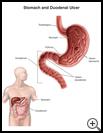
Ulcer in the Stomach: Brief Version
________________________________________________________________________
KEY POINTS
- A stomach ulcer is a raw place or sore in your stomach that happens when the protective layer in the stomach lining breaks down.
- Your healthcare provider may give you medicines to treat an infection, to decrease the acid in your stomach, or to coat and protect your stomach lining. If the ulcer is severe, you may need surgery.
- Ask your healthcare provider how to take care of yourself at home, what symptoms or problems you should watch for, and what to do if you have them.
________________________________________________________________________
What is a stomach ulcer?
A stomach ulcer is a raw place or sore in the lining of the stomach. It is also called a gastric or peptic ulcer.
How does it happen?
The lining of the stomach normally protects the stomach. It keeps it from being hurt by stomach acid. If the lining breaks down, stomach acids can damage the stomach. This can cause an ulcer. It may happen because:
- You have an Infection by bacteria called H. pylori. These bacteria cause most ulcers.
- You are taking aspirin, ibuprofen, or naproxen. These medicines can irritate the stomach.
- Your stomach makes too much acid.
Cigarettes and alcohol may make an ulcer worse. They may keep the ulcer from healing.
What are the symptoms?
You may have:
- A burning pain in your upper belly
- Pain that gets worse when your stomach is empty
- Pain that goes away after you eat
- Pain that wakes you up during the night
- Weight loss
If the ulcer bleeds:
- You may vomit and see blood in your vomit. You may see bright red blood. Or the blood may look like coffee grounds.
- Your bowel movements may be black and tarry.
How is it treated?
It is important to get treatment for an ulcer. Your healthcare provider may prescribe:
- Antibiotics to treat H. pylori bacteria
- Medicine to lower the acid in your stomach
- Medicine to coat and protect the lining of your stomach and intestine
Sometimes you may need to stay in the hospital for the first part of your treatment.
How can I take care of myself?
- Take all of the medicine prescribed by your healthcare provider.
- Keep all appointments with your provider.
- Eat the diet recommended by your provider.
- Avoid alcohol, cigarettes, and chewing tobacco. These substances can make it harder for ulcers to heal. Talk to your provider if you need help stopping alcohol or tobacco.
- Ask your provider if you need to stop taking some medicines, like aspirin or ibuprofen.
- Ask your provider what symptoms or problems you should watch for. Ask what you should do if you have them.

